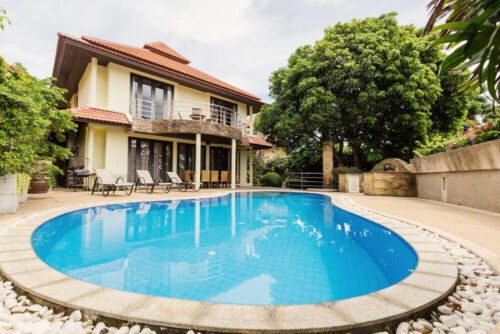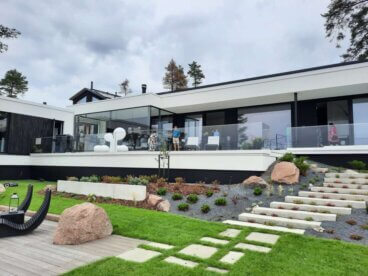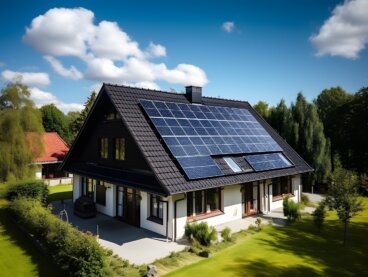Thermal Pools

Thermal pools are built from a material called extruded polystyrene, and they’ve revolutionized the swimming pool sector.
They are an innovative, modular, and self-supporting pool solution. Also, they don’t leak and are good for installation on roofs.
The thermal pool system is characterized by its modular installation, which uses a prefabricated swimming pool construction. Once in place, the installers prepare it for its final insulating and waterproof coating. Thanks to this, thermal pools are watertight.
You can also use these self-supporting modules if you wish to install them in a spa. Their use is becoming popular in the installation of swimming pools for hotels and rooftop areas.
Thermal pools, an accessible solution
Due to the self-supporting system of thermal pools, they can be installed in places that can’t normally have a pool. This type of pool can withstand the weight of water and supports up to 2,400 kg/m3 compared to 80 kg/m3 for traditional concrete.
A thermal pool system can have various swimming pool accessories such as stairs, ramps, and even benches.
Additionally, people like to use this system to replace the traditional metal ladder. This allows access for people with reduced mobility.
To install a thermal pool, there’s no need to build a concrete or construction pool because it’s modular. One of the great advantages is that it allows quick and easy installation thanks to its dry construction.
These pools don’t require waiting time. In fact, at the end of their installation, they’re all set for the immediate application of their final coating.
Pools with high energy efficiency

It’s important to emphasize that thermal pools are made of modular elements which, in turn, are formed by an insulating core. This provides energy efficiency, which makes significant savings.
The energy savings of thermal pools is very significant both during their operation and throughout their lifetime. Another aspect to take into account is the savings in labor thanks to the prefabrication.
Thermal pools don’t require the use of auxiliary work such as building, cranes, or other processes that traditional pools require.
Once the assembly of all the parts is ready, the team of professionals can install the pool.
Main advantages of thermal pools
The self-supporting and modular system of these pools makes their installation easier. Thanks to this, it’s possible to install them in difficult areas and even in adverse conditions.
Thermal pools have a high resistance to the weight of water.
Due to greater energy efficiency, the cost of installing thermal pools pays off earlier than with the construction of traditional swimming pools. Additionally, due to their material, they maintain the water temperature and reduce energy loss in comparison with concrete.
Lastly, the client can make adjustments to the structure before delivery and final placement, as the system is supervised and factory-made.
The process of construction and assembling thermal pools

First, the client must approve the design. Then, the construction of the pool at the factory can proceed.
The design of the pool, as well as the cutting of the structure into modules, is carried out using computer programs and 3D simulators. A computer controls this whole process and each module created results from a complex numerical process.
Once the cutting of the modules is ready, a robot makes each part. Once humans then review and correct any errors, the assembly of all the pieces takes place.
Thanks to this modular system, any type of swimming pool can be tailor-made no matter how complex it may be. There are very versatile and light pools. This is because, due to their materials, the structural weight is low in comparison to that of concrete pools.
As you can see, thermal pools are a great idea. The work is quick and clean. They’re assembled like a puzzle, putting each piece together to get the final result – a pool to relax in.
Thermal pools are built from a material called extruded polystyrene, and they’ve revolutionized the swimming pool sector.
They are an innovative, modular, and self-supporting pool solution. Also, they don’t leak and are good for installation on roofs.
The thermal pool system is characterized by its modular installation, which uses a prefabricated swimming pool construction. Once in place, the installers prepare it for its final insulating and waterproof coating. Thanks to this, thermal pools are watertight.
You can also use these self-supporting modules if you wish to install them in a spa. Their use is becoming popular in the installation of swimming pools for hotels and rooftop areas.
Thermal pools, an accessible solution
Due to the self-supporting system of thermal pools, they can be installed in places that can’t normally have a pool. This type of pool can withstand the weight of water and supports up to 2,400 kg/m3 compared to 80 kg/m3 for traditional concrete.
A thermal pool system can have various swimming pool accessories such as stairs, ramps, and even benches.
Additionally, people like to use this system to replace the traditional metal ladder. This allows access for people with reduced mobility.
To install a thermal pool, there’s no need to build a concrete or construction pool because it’s modular. One of the great advantages is that it allows quick and easy installation thanks to its dry construction.
These pools don’t require waiting time. In fact, at the end of their installation, they’re all set for the immediate application of their final coating.
Pools with high energy efficiency

It’s important to emphasize that thermal pools are made of modular elements which, in turn, are formed by an insulating core. This provides energy efficiency, which makes significant savings.
The energy savings of thermal pools is very significant both during their operation and throughout their lifetime. Another aspect to take into account is the savings in labor thanks to the prefabrication.
Thermal pools don’t require the use of auxiliary work such as building, cranes, or other processes that traditional pools require.
Once the assembly of all the parts is ready, the team of professionals can install the pool.
Main advantages of thermal pools
The self-supporting and modular system of these pools makes their installation easier. Thanks to this, it’s possible to install them in difficult areas and even in adverse conditions.
Thermal pools have a high resistance to the weight of water.
Due to greater energy efficiency, the cost of installing thermal pools pays off earlier than with the construction of traditional swimming pools. Additionally, due to their material, they maintain the water temperature and reduce energy loss in comparison with concrete.
Lastly, the client can make adjustments to the structure before delivery and final placement, as the system is supervised and factory-made.
The process of construction and assembling thermal pools

First, the client must approve the design. Then, the construction of the pool at the factory can proceed.
The design of the pool, as well as the cutting of the structure into modules, is carried out using computer programs and 3D simulators. A computer controls this whole process and each module created results from a complex numerical process.
Once the cutting of the modules is ready, a robot makes each part. Once humans then review and correct any errors, the assembly of all the pieces takes place.
Thanks to this modular system, any type of swimming pool can be tailor-made no matter how complex it may be. There are very versatile and light pools. This is because, due to their materials, the structural weight is low in comparison to that of concrete pools.
As you can see, thermal pools are a great idea. The work is quick and clean. They’re assembled like a puzzle, putting each piece together to get the final result – a pool to relax in.







